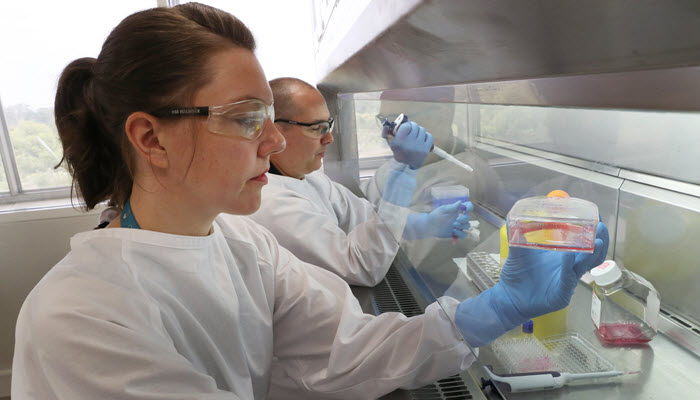
Ask a scientist about the obstacles to curing cancer, and the answer will point directly to our politicians.
After all, one told me a few years ago, what politician is going to commit to funding research years into the future, and then perhaps have the discovery revealed when someone else is in power?
“We would need to promise to find the cure in the one political term, and embargo it until the election campaign,’’ this scientist quipped.
It was tongue-in-cheek, but last week’s devastating news that the University of Queensland’s COVID-19 vaccine is being dumped raises again how we respect — or not — science research in this country.
While we applauded this team for their around-the-clock attempts to create a workable vaccine, that treatment is at odds with how we treat scientific requests for ongoing research funding.
Too often, good research is stopped because a grant runs out. Too often, talented young scientists are forced to halt their scientific work so that they can earn enough money to pay the rent. And too often, we allow small science fiefdoms at particular universities to work away, while similar research is also happening elsewhere.
Competition always sounds like a good idea but, public shows of collaboration notwithstanding, there is too much competition for the limited research dollars available in Australia. The result is inefficient allocation of money and career structures that discourage good researchers becoming great researchers.
On one hand, we encourage students — particularly girls — to focus on their STEM skills to be at the forefront of Australian research. Thousands of hours are put into that encouragement, inside our school gates. And then we condemn them to careers of rolling short-term contracts.
And in an era where certainty is treasured, and a bank won’t provide a loan without a permanent job, that simply doesn’t make sense. This pandemic has shown us how much we need a strong body of available and skilled researchers. It’s the obvious — but not the only “wicked” problem that could do with the best of our brainpower.
Unfortunately, too much of it is tied up in holding pattern jobs while waiting for an elusive vacancy in a university (and fat chance of that right now).
Or, for those who have a long-term job (and that means they can plan a life, buy a house and raise a family from the proceeds of their PhDs), too much time is spent navigating the research funding maze.
Little has changed since a group of Australian researchers in 2012 began some work on the inefficiencies of the research funding system. That research found the successful application rate was only 15%. Despite that, each application took an average of 34 days. Imagine the research that could have been conducted in that time.
Collectively that year, medical researchers spent the equivalent of 550 years putting together funding applications, according to one of the co-authors of that research, QUT Professor Adrian Barnett.
And that figure blew out to 614 years in 2014, despite the National Health and Medical Research Council streamlining its processes. Barnett used that research to advocate for a different approach — that researchers prequalify for research funding eligibility and then enter a lottery system to see who gets the money.
Allocating funding in this way, he said, would eliminate the need for lengthy grant applications, and save potentially hundreds of years of scientific time in Australia.
That determining research priorities by lottery is a serious proposal shows how flawed the current scheme is — and how urgently it needs to be overhauled.
It’s akin to a justice system that determines guilt by the flip of a coin. Or a superannuation system that relies on the result of the fifth at Randwick.
It’s disappointing that University of Queensland researchers will not lead the world in halting this pandemic. But perhaps knowledge of their work provides a golden opportunity for Australian policymakers to ensure that it’s never funding, and an archaic funding process, that stands between a disease and a cure.








This is an excellent article, thank you. Research funding in Australia is badly broken. The primary problem is bureaucratic inefficiency and requiring fully fledged, completely budgeted and planned research proposals at one submission time, when the decisions are normally based on only a tiny proportion of the proposal. The secondary problem is the basis for decisions, which have shifted, as alluded to in the article, the “pub test”, ministerial discretion, or trends in what is perceived as a hot research topic. Peer review has far less value than it did previously.
We need multi-round research proposals, where anything that isn’t going to be funded because the minister won’t like it is discarded on the basis of a one pager. Then anything with potential can proceed to a full application. We also need at least a proportion of research funding to be fully academic, supporting ideas and directions that don’t have an immediately obvious application to all people. That is how you get really ground-breaking research done. It mostly ends up being pretty useful in the long term, and keeps some scientists working in the area they trained in so that our society has clever people in reserve for when a national crisis like this pandemic comes up and we need them.
Yeah okay, but peer-review-is-broken-so-lets-self-censor-for-the-minister sounds like the battle is already lost. A minister qualified to make the call would be nice to see. Independence from the minister would be a better starting point; not anarchy, just a codified structural independence. Works for the ABC whenever the minister is vaguely ethical, which I believe is a thing that used to happen occasionally.
A Minister should never be vetoing, or advocating for any particular research grant application. They have not a clue.
Correct.
I agree, that would be great to see.
For politicians, the problem is that no one can tell where pure research will generate an outcome. Take Nuclear magnetic resonance (NMR). This was achieved by the convergence of pure mathematics, nuclear physics, electronics and medical science. An unlikely combination.
Look at how King’s pet Limited News Party treats climate science….
Australia once had a world-leading and respected government-funded organisation dedicated to pure science – the CSIRO.
But the neolibs sacrificed it on the altar of the ‘free’ market.
Yep, good point and all, but this isn’t just a STEM problem. Applies to the humanities too. Applied Linguists don’t directly cure COVID-19, but they do research, they do collaborate with other disciplines, and they do have track record adding value at the pointy end of implementation, where what is said to whom matters. Countless invisible non-STEM folk are on exactly the same rolling contracts in exactly the same resource depleted environment that is described here.
We are a society which wilfully and increasingly privileges the few who manage the organisation of trade, over the supply of the basic needs of the many. It’s political, structural and cultural, and without research in the humanities, it is visible to the STEM world only when that world’s privilege slips for a moment, like now. So sure; more for STEM, but actually STEM already profits at the expense of the humanities, so how about some-more-please-sir for research per se?